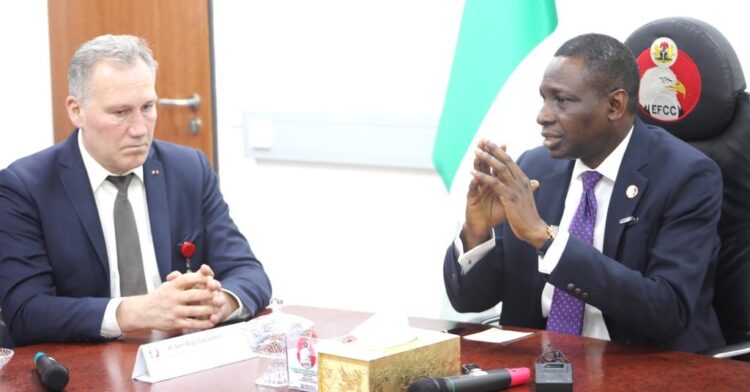The recent announcement of a collaboration between Nigeria’s Economic and Financial Crimes Commission (EFCC) and the French government to tackle cybercrime and track assets more effectively is a significant step forward in the fight against financial crime.
As an analyst with years of experience observing the interplay between governance, crime, and digital culture, I believe this partnership is not only timely but also crucial in strengthening Nigeria’s global reputation in financial security.
On March 4, 2025, Lieutenant General Régis Colombet, Director of Security and Defence Cooperation at the French Ministry for Europe and Foreign Affairs, visited the EFCC headquarters in Abuja to formalize this partnership.
The French government has pledged support in key areas such as asset tracking, cybercrime investigation, and security training. This move aligns with France’s broader strategic efforts to combat transnational crimes, particularly as cybercriminals continue to exploit digital loopholes across borders.
The implications of this alliance are immense. For years, Nigeria has battled cybercrime, often associated with online fraudsters known as ‘Yahoo Boys,’ who have tarnished the country’s image. However, it’s no longer just about email scams.
Ransomware attacks, cryptocurrency fraud, and financial terrorism are increasingly prevalent, necessitating international cooperation. The EFCC’s ability to tap into France’s expertise, including specialized training at centers like the Cyber School in Dakar, Senegal, will enhance its investigative capabilities.
Colombet emphasized that France has established additional training hubs, such as counterterrorism centers in Abidjan, Côte d’Ivoire, to address evolving security threats. This underscores the reality that cybercrime is no longer an isolated problem—it is a global menace.
His acknowledgment of the EFCC’s vital role in cross-border financial investigations is a recognition of Nigeria’s efforts and a sign that the country is seen as a serious player in the fight against economic crimes. EFCC Chairman Ola Olukoyede has rightly welcomed this partnership, reiterating the need for joint efforts in preventing and investigating cybercrime.
His revelation that the EFCC recently dismantled an international criminal syndicate planning to set up operations in Nigeria demonstrates that cybercriminal networks are increasingly sophisticated. The fact that some of the victims were located in France further justifies the necessity of this collaboration.
While the EFCC has made commendable strides, crime detection and investigation in Nigeria have historically been plagued by challenges, including inadequate technological tools and limited cross-border cooperation. This partnership with France presents an opportunity to bridge that gap. Leveraging France’s advanced digital forensic tools and investigative methods will empower the EFCC to stay ahead of cybercriminals.
Moreover, this move carries broader economic and diplomatic benefits. Nigeria has often been perceived as a hotbed for financial fraud, which has hurt investor confidence. Strengthening its cybercrime response will not only enhance national security but also attract foreign investments by reassuring investors that Nigeria is committed to financial integrity.
The EFCC-France partnership signals a shift from reactive enforcement to proactive crime prevention. If successfully implemented, it could serve as a model for other African nations battling similar issues. However, its success will depend on sustained commitment, resource allocation, and the political will to execute strategies beyond mere agreements.
Ultimately, cybercriminals thrive in jurisdictions with weak enforcement. This collaboration ensures that they have fewer places to hide and a higher likelihood of facing justice. For Nigeria, it is not just about stopping fraud—it’s about rewriting the narrative and proving that the nation is serious about combating financial crime on a global scale.






































Discussion about this post